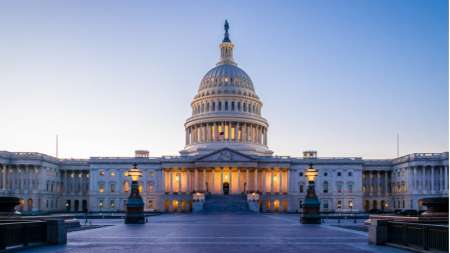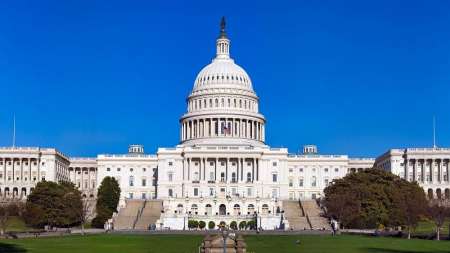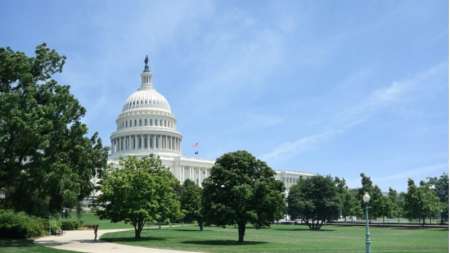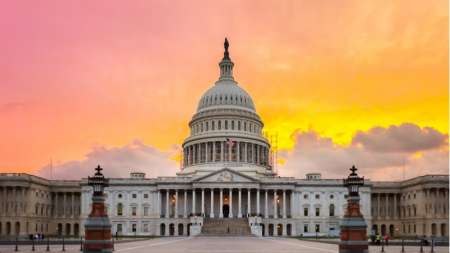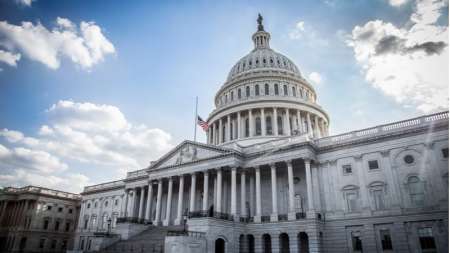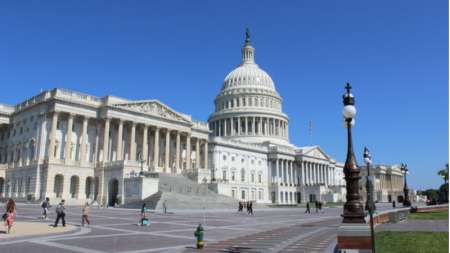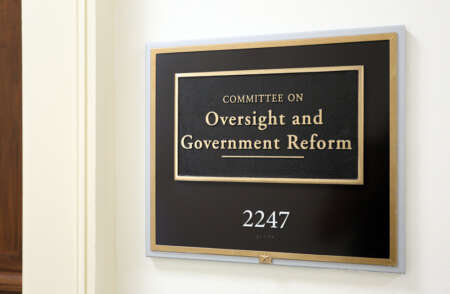President Donald Trump signed a massive reconciliation package into law on Friday that features several cyber and AI-related provisions, including those aimed at bolstering the Pentagon’s tech capabilities, building up rural healthcare systems, and adding more tools for monitoring the country’s borders. […]
Now that the Senate has pushed its version of reconciliation funding over the finish line amid a blizzard of changes to the bill, here’s a look at a few workforce and tech items that either failed to make the final version of the legislation, or were beaten back on the funding front during the process. […]
The U.S. Senate voted early Tuesday morning to drop from its reconciliation legislation a controversial 10-year moratorium on state regulation of artificial intelligence tech after the proposed ban met significant bipartisan pushback. […]
Bipartisan legislation introduced in the House aims to push Federal agencies to adopt electronic tools that simplify how Americans access help from the government. […]
Reps. Eric Burlison, R-Mo., and Suhas Subramanyam, D-Va., reintroduced the Federal Improvement in Technology (FIT) Procurement Act on Wednesday in an effort to streamline the Federal procurement process for agencies and their contractors. […]
The United States is on track to “experience a DeepSeek moment in quantum” unless it takes accelerated action on the quantum tech front, witnesses told lawmakers this week as they warned of “catastrophic” consequences if China wins the global race in quantum computing. […]
Senior Pentagon officials today unveiled a detailed breakdown of President Trump’s fiscal year (FY) 2026 Department of Defense (DoD) budget request that totals $1.01 trillion and includes major investments in cybersecurity, artificial intelligence (AI), and space-based capabilities. […]
House Republicans pushed the Department of Homeland Security (DHS)’s fiscal year 2026 budget plan out of committee on June 24 with higher levels of funding for the agency’s cybersecurity efforts than under the budget cut proposed by President Donald Trump. […]
Rep. Marjorie Taylor Greene, R-Ga., on June 24 called on Congress to make further reductions to Federal government spending while praising cost-cutting efforts that the White House’s Department of Government Efficiency (DOGE) has already undertaken. […]
A bipartisan group of lawmakers introduced a bill during a congressional hearing today that would prevent Federal agencies from buying or using artificial intelligence models created by companies with ties to the Chinese Communist Party (CCP) and other foreign adversaries. […]
Department of Veterans Affairs (VA) Secretary Doug Collins called on lawmakers today to provide the agency with a $3.5 billion increase in fiscal year (FY) 2026 for its Electronic Health Record Modernization (EHRM) program or risk more delays to the program’s rollout. […]
A proposed task force on artificial intelligence led by Federal agency leaders would work to eliminate deep fake-powered identity theft and fraud under new legislation introduced in the Senate. […]
The House Appropriations Committee’s Legislative Brach Subcommittee voted on Monday night to approve a $415 million budget for the Government Accountability Office (GAO) for fiscal year (FY) 2026 – marking a 48 percent year-over-year cut from GAO’s budget of $811.9 million in FY2025. […]
A bicameral group of Democrats is pressing Palantir on reported efforts to build a mega-database on Americans’ tax data and other information that the lawmakers warned would violate numerous Federal privacy statutes. […]
A bipartisan bill aimed at strengthening U.S. cryptography research and accelerating the deployment of quantum-resistant encryption cleared the House Science, Space, and Technology Committee last week. The bill now heads to the full House for further consideration. […]
Senate Committee on Homeland Security and Governmental Affairs Republicans released the text of their reconciliation bill on Friday, which contains language that would make it easier for the Trump administration to fire Federal employees. […]
James Walkinshaw, the Fairfax County, Va., supervisor and former chief of staff to Rep. Gerry Connolly, is pledging strong efforts to support the Federal workforce and improve oversight of government IT operations as he campaigns to succeed his former boss to represent the 11th district of Virginia in Congress. […]
A bipartisan group of lawmakers introduced legislation on June 12 that would direct the National Security Agency (NSA) to create an artificial intelligence playbook to help safeguard American AI systems from foreign espionage and cyberattacks. […]
More than 30 Democratic members of the House of Representatives are urging top Senate leaders to reconsider a proposal being offered in the Senate that would require states seeking Federal broadband support to abide by a proposed ten-year moratorium on creating state-level artificial intelligence (AI) regulations. […]
Sens. Ben Ray Luján, D-N.M., ranking member of the Senate Telecommunications and Media Subcommittee, and Deb Fischer, R-Neb., chair of the subcommittee, announced on Thursday the reconstitution of the Universal Service Fund (USF) Working Group. […]
Agentic artificial intelligence services – those that are designed to act with more autonomy than their generative or predictive AI forebears – drew a mixed reception today from lawmakers and witnesses who talked about the advantages of the latest AI flavor along with cybersecurity concerns during a hearing held by the House Homeland Security Committee’s Cybersecurity and Infrastructure Protection Subcommittee. […]
A bipartisan duo of Senate leaders reintroduced legislation on June 5 that aims to codify the right of Federal government employees to appeal the revocation or denial of a security clearance. […]
Bryan Bedford, President Donald Trump’s pick to lead the Federal Aviation Administration (FAA), told senators at his confirmation hearing today that he will work to overhaul the FAA’s safety culture if he is confirmed, and indicated that any move to privatize the FAA is not in the government’s near-term plans. […]
A group of Senate Democrats wants to direct an audit of Social Security Administration (SSA) networks and systems accessed by the Department of Government Efficiency (DOGE) to identify whether vulnerabilities were left behind from that access. […]
The Pandemic Response Accountability Committee (PRAC) issued a Fraud Prevention Alert this week that argues the Federal government could have saved an estimated $79 billion if it had implemented data analytics to prevent pandemic-related fraud. […]
A small but significant slice of lawmakers – including several Republican members of the House and Senate – are getting cold feet over supporting the Trump administration’s reconciliation funding bill because it includes a House-approved provision that would impose a 10-year moratorium on state-level artificial intelligence regulation. […]
Lawmakers from both parties grilled top Pentagon brass on June 5 about delays to the fiscal year (FY) 2026 defense budget and proposed cuts to U.S. Space Force funding despite the force’s importance in building out the Golden Dome missile defense program. […]
House Oversight and Accountability Committee Democrats moved to subpoena Elon Musk – former White House senior advisor and public face of the Department of Government Efficiency (DOGE) – ahead of a hearing today on artificial intelligence and data, where lawmakers were warned that DOGE’s push to dismantle agency data silos could endanger national cybersecurity. […]
A bipartisan group of senators has reintroduced legislation that aims to streamline software purchasing across the Federal government with a goal of reducing unnecessary costs. […]
Sean Cairncross, the White House’s nominee to serve as national cyber director, told lawmakers during his confirmation hearing on Thursday that interagency and public-private partnerships will be a top priority for him if his nomination wins full Senate approval. […]


